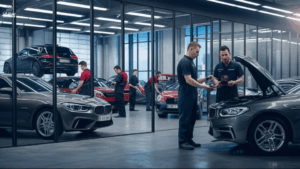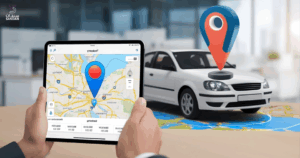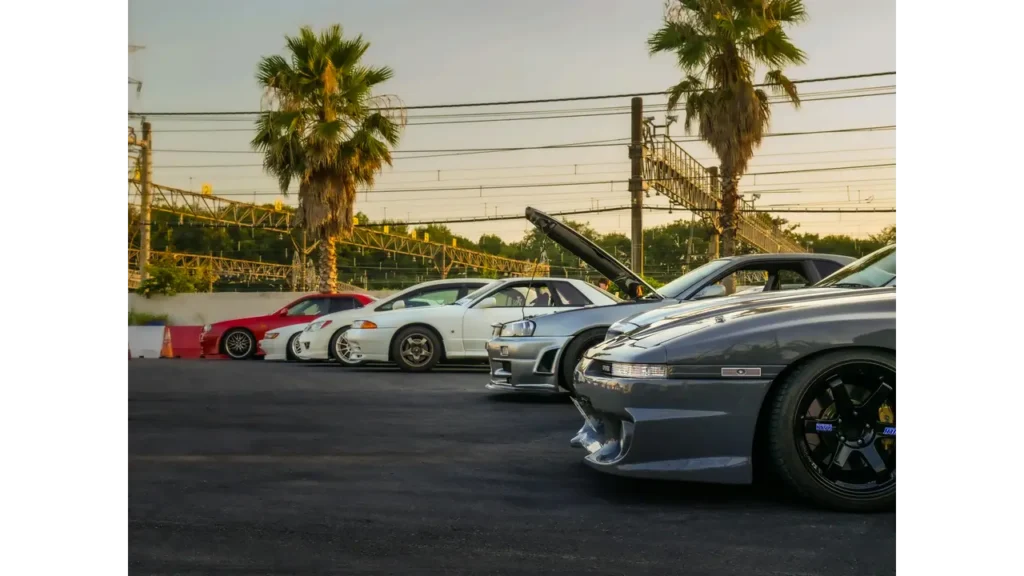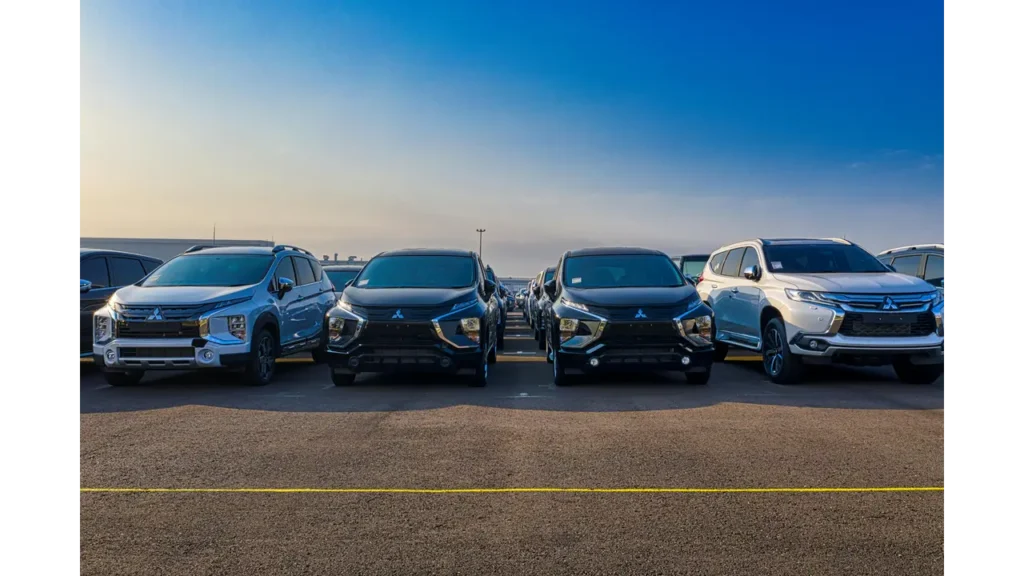The automotive industry in Oman is evolving rapidly, driven by rising customer expectations, increasing vehicle ownership, and the demand for faster, more seamless service experiences. In this dynamic landscape, co-locating automotive workshops with retail showrooms has emerged as a strategic model that delivers value on multiple fronts—operationally, financially, and in terms of customer satisfaction.
Traditionally, car showrooms and service centers have operated as separate entities, often causing inconvenience for customers and inefficiencies for business owners. But now, businesses are rethinking that approach. By choosing to co-locate workshop showroom Oman, automotive retailers can consolidate operations, enhance brand experience, and provide end-to-end service from vehicle purchase to maintenance, all under one roof.
This trend is gaining momentum in Oman, especially with the rise of integrated industrial spaces like Sandan Industrial Park, which support flexible layouts and dual-use permits. From reducing overheads to boosting customer loyalty, co-location is proving to be more than just a smart design—it’s a future-forward business model.
In this blog, we’ll explore what co-location means, why it’s ideal for Oman’s automotive market, how to execute it, and where opportunities like Sandan make it even easier to succeed.
What Is Co-Locating Workshops with Showrooms?
Co-locating refers to placing two interdependent business operations—like a car showroom and a service workshop—within the same physical location. In the automotive context, this model allows customers to purchase, service, and maintain their vehicles all in one place, creating a unified and highly efficient customer journey.
Instead of operating separate properties for sales and after-sales, businesses can co-locate workshop showrooms in Oman to streamline operations, reduce overhead costs, and improve brand consistency across every touchpoint.
How It Works: Integrated Experience, Single Destination
A co-located facility typically includes a retail space for displaying vehicles and a fully equipped service bay or workshop either attached to or adjacent to the showroom. The layout may be open-plan or separated by zones, depending on local zoning rules and customer flow needs. Some setups even allow customers to view their car being serviced while they wait in the showroom lounge.
This integration minimizes vehicle transfer time between sales and service and helps the business cross-sell value-added services like extended warranties, accessories, or detailing packages.
Types of Co-Located Formats
There are several models for co-located facilities:
- Attached service bays are integrated into the rear or side of the showroom.
- Adjacent workshops were built on the same plot but with separate entries.
- Shared premises, especially in industrial parks, where multiple automotive businesses operate side by side with common infrastructure.
Each format can be tailored based on budget, space availability, and business goals.
Global Trends and Local Adaptation in Oman
Globally, co-location is widely adopted by both luxury and economy vehicle brands to improve operational efficiency and customer loyalty. In Oman, the trend is emerging, especially within modern industrial parks and mixed-use zones.
New developments like Sandan Industrial Park are encouraging entrepreneurs to co-locate workshop showrooms in Oman by offering zoning flexibility, supportive infrastructure, and lower land leasing costs. This creates the ideal environment for businesses to tap into the full potential of integrated automotive operations.
Benefits of Co-Locating Automotive Facilities
The decision to co-locate the workshop showroom in Oman is more than just a real estate strategy—it’s a move that can transform the way automotive businesses operate, serve customers, and scale over time. From cost savings to operational synergy, the advantages span across the value chain.
#1 Business Advantages: Operational Efficiency & Cost Savings
For businesses, co-location allows for smarter land use and reduced infrastructure duplication. Instead of managing two separate properties—one for sales and another for service—a single integrated facility significantly cuts down on rental or ownership costs, utilities, staffing, and maintenance.
It also enhances brand cohesion. Having a seamless space that represents both sales and after-sales reinforces the professionalism and trustworthiness of the brand. Inventory, records, and logistics become easier to manage when all teams operate under one roof. It fosters better cross-departmental coordination and leads to faster turnaround times, which is essential in competitive markets like Oman.
#2 Customer Experience: Convenience and Trust
From a customer’s point of view, having the ability to view, buy, service, and even accessorize their vehicle in one place is a major convenience. There’s no need to drive across town for maintenance or diagnostics—they simply return to the same location where they were purchased.
This integrated experience builds trust and long-term relationships. Customers feel they are dealing with a full-service brand that values both the sale and the after-sales journey. For used car dealers and multi-brand retailers in Oman, this is a key differentiator.
#3 Employee Efficiency: Communication and Shared Resources
Employees in co-located facilities benefit from improved collaboration and resource-sharing. Sales and service teams can easily coordinate schedules, updates, or client-specific requests. Mechanics, service advisors, and showroom consultants can work more fluidly, increasing responsiveness and reducing errors.
Shared amenities like reception desks, lounges, parking spaces, and break rooms further streamline operations and reduce overhead.
#4 Boosting Loyalty and After-Sales Revenue
By choosing to co-locate a workshop showroom in Oman, businesses improve customer retention and increase after-sales revenue streams. A satisfied customer is far more likely to return for periodic maintenance, parts replacement, and upgrades when their service center is in the same location as their trusted showroom.
In the long run, co-location transforms a one-time sale into a full lifecycle relationship, making it not just efficient but strategically profitable.

Oman’s Automotive Market: Why It’s Ripe for Co-Location
#1 Surging Car Sales and Aftermarket Demand
Oman’s automotive market is experiencing a steady uptick in car ownership, driven by population growth, urban expansion, and increased access to financing. With higher vehicle sales comes the inevitable rise in demand for after-sales services—regular maintenance, repairs, diagnostics, and accessories. However, many standalone showrooms struggle to keep up with this servicing load due to space limitations or the need for external partnerships.
Co-locating workshop and showroom operations provides a natural solution to this challenge. Businesses can meet the growing servicing needs without sacrificing quality or customer convenience.
#2 The Rise of Used Car Dealerships and Multi-Brand Workshops
In recent years, Oman has seen a boom in used car dealerships and multi-brand service centers, especially in urban hubs like Muscat, Seeb, and Sohar. These businesses thrive on agility—serving a wide range of makes and models, often with tight margins. For them, the ability to co-locate workshop showroom Oman means fewer logistical hassles, streamlined overheads, and faster service turnover.
Rather than splitting operations across different sites, these businesses can build loyalty and reduce operational friction by delivering a one-stop solution from sales to service.
#3 Urban Real Estate Pressures and Limited Space
Cities like Muscat are facing real estate pressures due to increasing commercial demand and limited zoned industrial land. Securing two separate plots for a showroom and a workshop can be both expensive and inefficient.
This is where co-location becomes essential. Combining both functions within a single plot or facility allows businesses to maximize square footage, lower rental costs, and maintain operational focus without sacrificing service quality.
#4 Vision 2040 and Industrial Integration
Oman Vision 2040 emphasizes economic diversification and industrial integration, including streamlined support for SMEs and automotive sector modernization. Co-located facilities align perfectly with these goals by promoting efficient land use, job creation, and customer-centric service models.
As Oman accelerates its infrastructure and private sector growth, businesses that invest early in integrated formats stand to benefit from government incentives and first-mover advantage.
Why Now Is the Time to Co-Locate?
Given the combination of rising vehicle ownership, customer expectations for convenience, and favorable industrial policies, the timing couldn’t be better to co-locate a workshop showroom in Oman. Whether for established dealerships or emerging auto brands, co-location is no longer just a trend—it’s the new industry standard.
Ideal Layouts and Infrastructure for Co-Located Spaces
Smart Design Principles: Function Meets Flow
A successful co-located automotive facility requires more than just shared walls. Thoughtful layout and zoning are crucial to ensure seamless operations and a pleasant customer experience. Showroom and service areas must be clearly demarcated yet operationally linked.
Vehicle flow should be intuitive—customers should be able to enter, browse, buy, and have their vehicle serviced without crossing into back-end zones like repair bays or storage areas. Waiting lounges, consultation desks, and display areas should be positioned near entry points, while service and parts logistics should happen out of sight.
Zoning the premises to separate clean (sales) and functional (service) spaces ensures both efficiency and compliance with municipal guidelines when businesses choose to co-locate a workshop showroom in Oman.
Making the Most of Limited Urban Plots
In high-demand areas like Muscat, maximizing space is critical. Vertical layouts—where the workshop is located behind or below the showroom—can be effective. Rolling shutters, compact service bays, and vehicle lifts are space-efficient options that don’t compromise on functionality.
For smaller plots, modular partitions and multipurpose zones can help meet both retail and mechanical needs within the same footprint. This allows newer entrants or SMEs to scale gradually without needing large capital or space.
Essential Infrastructure Elements
To co-locate the workshop showroom in Oman effectively, certain infrastructural elements must be part of the initial design. These include:
- Ventilation systems to manage fumes in service bays.
- Oil and water drainage systems that comply with environmental codes.
- Dedicated access points for service entries and test drives, separate from customer parking zones.
- Robust electrical and telecom wiring for diagnostics and payment systems.
Proper planning of these elements ensures that the facility runs smoothly without service interruptions or safety risks.
Why Industrial Parks Like Sandan Make It Easier?
Industrial parks such as Sandan provide pre-zoned, utility-ready plots that simplify the setup process. Businesses benefit from shared services, ample parking, and flexible leasing—ideal conditions to co-locate a workshop showroom in Oman without dealing with restrictive urban regulations.
Sandan’s infrastructure also supports expansion, allowing businesses to scale up operations as demand grows, all while maintaining efficiency and customer satisfaction.
Regulatory and Licensing Considerations in Oman
Mixed-Use Permissions from MoCIIP and Municipal Authorities
To legally co-locate a workshop showroom in Oman, businesses must obtain approval from the Ministry of Commerce, Industry and Investment Promotion (MoCIIP) along with relevant municipal departments. Mixed-use facilities, where sales and mechanical operations occur on the same premises, require explicit permissions that clarify the intended use, business activities, and layout.
Applications must include detailed business plans, layout drawings, and proof of land use approval from the municipal authorities. Failure to declare dual use can result in penalties or forced operational shutdowns.
Zoning and Safety Compliance
Oman has specific zoning laws that define which areas are permissible for automotive showrooms and workshops. Urban plots may be limited to retail use only, while industrial zones allow for full-service co-location. Before signing any lease or purchasing land, ensure that the plot is designated for mixed or industrial use.
Safety compliance is equally important. Fire-resistant materials, emergency exits, proper ventilation, and equipment spacing must all adhere to municipal and Civil Defence regulations.
Mandatory Approvals: Parking, Fire, Environment
Several additional approvals are required, including:
- Parking clearance for both visitors and serviced vehicles.
- Fire safety approvals, including extinguisher placement, fire alarms, and escape routes.
- Environmental clearance, particularly if the workshop handles oil, batteries, or paints.
These approvals may differ slightly between governorates, but they are mandatory for operating a legal co-located facility.
Tips to Streamline Setup
To expedite the process, it’s advisable to:
- Engage a local business consultant with experience in automotive licensing.
- Work closely with the real estate or industrial park management team, especially in developments like Sandan, where processes are often centralized.
- Ensure all architectural and utility plans are pre-approved before applying for operational licenses.
With the right planning and expert support, setting up to co-located workshop showroom in Oman becomes a smooth, structured process aligned with Omani regulations.
Cost Implications & ROI Analysis
Initial Setup Costs: Land, Permits, and Construction
The upfront investment required to co-locate a workshop showroom in Oman can vary based on location, facility size, and scope of services. Key cost components include land acquisition or leasing (especially in industrial parks like Sandan), architectural design, structural construction, and regulatory permits. Additional expenses may involve internal fit-outs, such as tiled showrooms, service bays with lifts, oil disposal systems, and customer lounges.
Permits from MoCIIP, municipality, Civil Defence, and environmental bodies also add to the initial cost, but co-locating within a pre-zoned industrial area can significantly lower bureaucratic hurdles and speed up approvals.
Operational Savings Through Shared Resources
Once operational, the co-located model offers tangible cost savings. Utilities like electricity, water, internet, and maintenance services can be shared between the showroom and workshop instead of being duplicated across separate locations. Staff resources—such as receptionists, security, and cleaning teams—can also be centralized, reducing overhead.
This shared operational model becomes especially profitable for mid-sized businesses aiming to maximize output without dramatically increasing cost structures.
Boosting Revenue Through Cross-Sell and After-sales
A key financial benefit when you co-locate a workshop showroomin Oman is the ability to drive aftersales revenue. Customers who purchase vehicles on-site are more likely to return for regular maintenance, upgrades, or accessories, generating long-term income with minimal marketing effort.
Furthermore, service teams can upsell diagnostics, extended warranties, or detailing packages during routine checkups, enhancing revenue per customer. It also improves customer retention and lifetime value.
3–5 Year ROI Projection
Depending on scale and efficiency, most co-located automotive businesses in Oman can begin recovering their investment within 3 to 5 years. The ROI accelerates when:
- The business is situated in a high-traffic area.
- After-sales operations run at high volume.
- Overheads are controlled through intelligent design and industrial park benefits.
By combining front-end sales with backend servicing in one location, businesses build recurring revenue streams and brand loyalty simultaneously, turning the integrated model into a high-performing, sustainable investment.
Spotlight: Sandan as a Co-Location Hub
From zoning flexibility and utility access to on-ground support and affordability, Sandan checks every box for automotive businesses seeking to integrate sales and service. The park’s infrastructure is designed to support scalable operations, while its location boosts visibility and customer access.
#1 Strategic Proximity to Muscat and Key Traffic Corridors
Sandan Industrial Park is strategically located just outside Muscat, making it highly accessible to both local customers and intercity vehicle traffic. Its position near major highways ensures consistent footfall from private owners, fleet operators, and transport companies, making it an ideal location to co-locate a workshop showroom in Oman without the high costs of urban real estate. This proximity also enables fast logistics, whether it’s moving vehicles from the showroom to the customer or bringing them back for servicing and repairs.
#2 Ready-to-Use Plots and Industrial-Grade Infrastructure
One of Sandan’s biggest advantages is its offering of pre-approved commercial and industrial plots. These are equipped with essential utilities—power, water, drainage, and telecommunications—minimizing delays in setting up integrated automotive operations. The park supports mixed-use models and helps businesses obtain the necessary permits for both showroom and workshop functionalities, simplifying the regulatory process significantly.
#3 Affordable Rent and a Thriving Automotive Ecosystem
Unlike densely packed commercial zones in Muscat, Sandan offers affordable leasing options tailored for SMEs, startups, and expanding dealerships. The area also hosts a growing network of automotive businesses—tire shops, car care centers, accessory retailers, and banks—which makes it easier for customers to find everything they need in one trip. This built-in ecosystem enhances service delivery, encourages cross-referrals, and supports operational convenience for businesses looking to co-locate a workshop showroom in Oman.
Tips for Businesses Planning Co-Location
Setting up a successful co-located automotive facility requires thoughtful planning from the ground up. Here’s how businesses in Oman can get it right:
#1 Choose a Location with Zoning Flexibility
Not all commercial areas in Oman permit dual-use automotive functions. It’s essential to choose a site—such as Sandan Industrial Park—where the land is already zoned for both showroom and workshop activities. This reduces approval timelines and minimizes regulatory friction. Selecting the right location early can make or break your ability to co-locate workshop showroom Oman effectively.
#2 Invest in Scalable Infrastructure
Plan for future growth from day one. Whether it’s allocating space for additional service bays or wiring for EV diagnostics, the infrastructure should accommodate your evolving business model. Scalability not only saves on retrofitting costs but also ensures your facility remains competitive over time.
#3 Design with the Customer in Mind
Layout plays a critical role in customer satisfaction. Ensure there’s clear signage, separate entries for service and sales, and comfortable waiting areas. A smooth, intuitive customer flow builds trust and increases the chances of repeat business.
#4 Engage Authorities Early in the Process
Approvals from MoCIIP, the municipality, Civil Defence, and environmental departments can take time. Start the documentation and submission process early to avoid project delays. Industrial parks like Sandan often assist in liaising with these bodies.
#5 Hire Expert Consultants for Design and Licensing
Local business consultants and architectural firms familiar with Oman’s automotive regulations can guide you through layout design, permit applications, and compliance checks. Their expertise can reduce errors, save time, and ensure that your plan to co-locate workshop showroom Oman meets every legal requirement from the outset.
FAQs
What does it mean to co-locate a workshop showroom in Oman?
It refers to setting up a vehicle sales showroom and a servicing workshop within the same premises or plot. This model allows businesses in Oman to offer an integrated experience for customers—from purchasing a car to maintaining it—under one roof.
Is it legal to co-locate automotive sales and service operations in Oman?
Yes, but businesses must acquire the right permissions from MoCIIP and local municipal authorities. The location must be zoned for mixed-use, and the facility must meet safety, environmental, and infrastructure compliance standards.
What are the benefits of co-locating in Sandan Industrial Park?
Sandan offers pre-zoned, permit-ready plots ideal for those planning to co-locate a workshop showroom in Oman. It also provides integrated infrastructure, affordable leasing, and a ready automotive ecosystem that includes banks, tire shops, and accessory outlets.
How much does it cost to co-locate workshop and showroom facilities in Oman?
Costs vary depending on land size, construction design, and services offered. However, co-locating reduces overall CapEx and OpEx by sharing utilities, staff, and operational resources—often yielding a faster ROI within 3–5 years.
Can foreign investors set up a co-located automotive business in Oman?
Yes. Oman allows 100% foreign ownership in many sectors, including automotive. With the right permits and industrial partners, foreign investors can legally and profitably co-locate a workshop showroom in Oman.

Conclusion
As Oman’s automotive landscape continues to evolve, customer expectations are shifting toward speed, convenience, and full-service experiences. The ability to co-locate workshop showroom Oman is no longer just a competitive advantage—it’s becoming an operational necessity for businesses that want to deliver seamless value from sale to service.
From real estate efficiency and operational savings to stronger customer loyalty and after-sales revenue, co-located facilities unlock a holistic model that benefits every stakeholder involved. With government support, favorable zoning policies, and strategic hubs like Sandan Industrial Park offering ready infrastructure, there’s never been a better time to invest in this integrated approach.
For dealerships, multi-brand showrooms, or service-focused entrepreneurs, co-location is the smart way forward—creating stronger brands, happier customers, and more sustainable margins.
Looking to co-locate a workshop showroom in Oman with confidence?
Explore your opportunity at Sandan today—where business meets convenience, infrastructure, and growth.












